#terry pratchett is watching us
Text
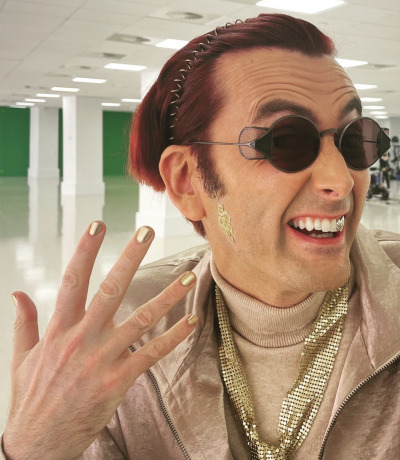
this picture just means to much to me that i can't even describe it.
#crowley#yassifie#neil gaiman#neil gaiman is watching us#good omens#go2#terry pratchett is watching us#terry pratchett
754 notes
·
View notes
Text

As a little Terry Pratchett tribute today I wanted to draw the two fictional men that have inspired me to create more than anything has in a long time.
And also a little tribute to the community surrounding these books that makes me want to share my creations instead of hiding them away. It's meant more than you know.
#sam vimes#vetinari#discworld#Terry Pratchett day#gnu terry pratchett#lord vetinari#Night watch#the glorious 25th of may#And if you squint#vetvimes#Just a couple of guys on an evening stroll#What of it#Or maybe this is us strolling along and talking about Characters like we're ancient philosophers
158 notes
·
View notes
Text
starting a support group for everyone who felt personally victimized by tiny nobby nobbs in night watch
#HIS DAD USED TO BREAK HIS AMRS?? KEEL GAVE HIM A SPOON THIRTY YEARS AGO AND HE STILL TALKS ABOUT IT!! HE RISKED HIS LIFE TO WARN VIMES OF#HIS MURDER!! HIS DAD WAS ONCE SOBER FOR TWO WHOLE DAYS AND CARVED HIM A SOLDIER TOY!!! HE CRIED WHEN THE MAJOR CALLED HIM A TRAITOR TO ANKH#MORPORK BC HE IS A MORPORKIAN BOY GODDAMNIT!!! HE CARVED HIMSELF HIS OWN BADGE FROM SOAP!! HE!!!!!!!!!!!!???!!!!!!!#i need to be institutionalized#nobby nobbs#gnu terry pratchett#discworld#night watch#HE WANTS TO BE A SOLDIER IF HE SURVIVES!!!!! IF!!!! IF?!!!?????! IF!!!!!!!!!!!!!!!!!!!!!!!!!!!!!!!!!#HES LIKE FUCKING 8 YEARS OLD WHAT THE FUCK
137 notes
·
View notes
Text
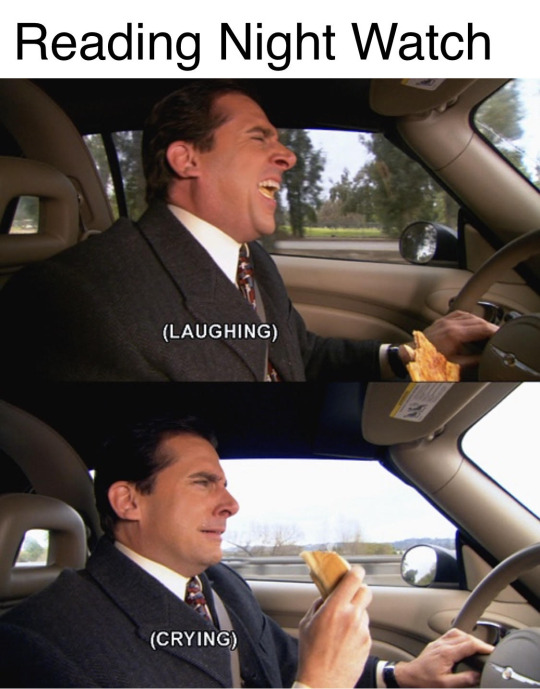
#discworld#gnu terry pratchett#discworld meme#created by yours truly#the watch#night watch#all the little angels#how do they rise up?#the glorious 25th of may#the glorious revolution of the people's republic of treacle mine road#the office#the office us
73 notes
·
View notes
Text
My Vimes playlist! I have many thoughts and feelings about him... this was the first Discworld playlist I put together and I started it after reading that dinner party scene in Men at Arms, which is why Your Racist Friend is the first song. some of these songs are ones Vimes himself would hate deeply but the energy or lyrics persuaded me to put them in. If you're interested in the reasoning behind the song choices, I'm putting that under the cut.
Thee Vimes song , just Him:
Get Better by Frank Turner
Being a watchman and The City, always The City:
I Predict a Riot by the Kaiser Cheifs
The Ankh Morpork Night Watch by Louie Zong
London Calling by The Clash
Shes Always a Woman by Billy Joel
All Along The Watch Tower by Jimi Hendrix (a conversation, Vimes gets the cover by Jimi hendrix which is rawer and darker than the original, Vetinari gets the BSG cover)
We Live In a Dump by They Might Be Giants
Sam and Sybil feelings (from vimes's pov mostly):
Synopsis for Latecomers by They Might Be Giants
The night Chicago Died by Paper Lace
Hey Julie by Fountains of Wayne
Work Song by Hozier
A Hard Days Night by The Beatles
Waterloo by Abba (for the whole describing sybil in military terms of it all)
I Walk The Line by Johnny Cash
Uptown Girl by Billy Joel
Answer by They Might Be Giants
Once in a Lifetime by Talking Heads
Hopeless Bleak Despair by They Might Be Giants
Fat Bottomed Girls by Queen (couldn't help myself sorry)
Next To Me by Imagine Dragons
Never Knew Love by TMBG
Vimes is powered by pure Rage and a drive to be better than he was:
Heel Turn 2 by The Mountain Goats
Believer by Imagine Dragons
Old Pine Box by TMBG
Can't Keep Johnny Down by TMBG
Hand Me My Shovel I'm Going In by Will Wood and The Tapeworms
Lets Get This Over With by TMBG
Demons by Imagine Dragons
Eight by Sleeping at Last
The Body Is A Blade by Japanese Breakfast
Hes also an ex-alchoholic
The Lady and the Tiger by TMBG (thinking of the summoning dark)
My songs know what you did in the dark by Fall Out Boy
Brain Problem Situation by TMBG
I think about Night Watch a normal amount (everyday all day)
Tubthumping cover by TMBG
Bringing Home The Rain by The Builders and The Butchers
Zombie by The Cranberries
At The End Of The Day from Le Mis
All the Little Angels (rise up) by DJ Boogie (fav interpretation of the song)
Prelude/ Angry Young Man by Billy Joel (this is a reg show song but I don't have a reg playlist, it fits Vimes too tho)
Empty Chairs at Empty Tables from Le Mis
the Communists Have the Music by TMBG
Cable Street by The Young'uns
Cap In Hand by the Proclaimers
Nina Cried Power by Hozier
Fortunate Son by Credence Clearwater Revival
You Already Live in Tomorrow by Fauxny
Vimes and Themes/Motifs mainly Dogs and fire (hes an arsonist and I think about this often, We all know the rain/water themes for him but can we talk about FIRE):
Hey Bulldog by The Beatles
The Angriest Dog in the World by The Superman Revenge Squad Band
Burning Pile by Mother Mother
Arsonists Lullaby by Hozier
Burn it Down by Vixy and Tony
You're On Fire by TMBG
Vimes has daddy/fatherhood issues
I Earn My Life by Lemon Demon
Cats in The Cradle by Harry Chapin
this is also why theres intentionally a lot of what I consider Dad music on this playlist, based mostly on my own dad's music tastes
Misc:
Confrontation from Jekyll and Hyde ( because of the whole Summoning Dark thing)
Facade also from Jekyll and Hyde (his reaction to rich people, also for the Boots line)
#discworld#sam vimes#gnu terry pratchett#city watch#fanmix#sometimes the best way to organize your thoughts about a character is to organize a playlist about them#please drop your recs in the comments or tags if you have good vimes ones#some of these songs are surprise tools that will help us later in my other discworld playlists#but this was my first one cuz vimes#Spotify
19 notes
·
View notes
Text
And the bystanders, most of whom were now byrunners, and in certain instances bystampeders, fled and complained...
Raising Steam by Terry Pratchett
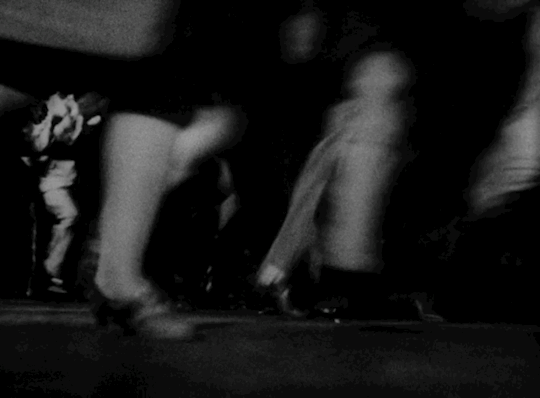
#gnu terry pratchett#raising steam#Discworld#book quotes#did NOT use the lion king gif bc watching it made me cry
2 notes
·
View notes
Text




This is the first time I've live somewhere where there were lilacs and they were still in bloom in May 25th.
GNU Terry Pratchett.
#Terry Pratchett#Discworld#night watch#i did use the auto filter on my phone#to make up for my lack of photography skills
14 notes
·
View notes
Text

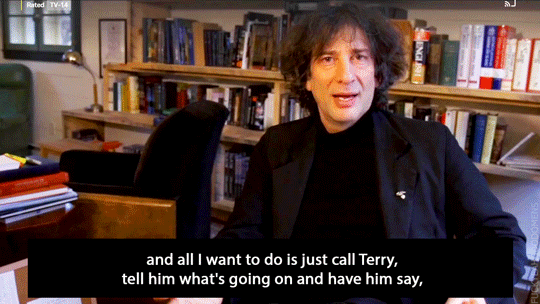
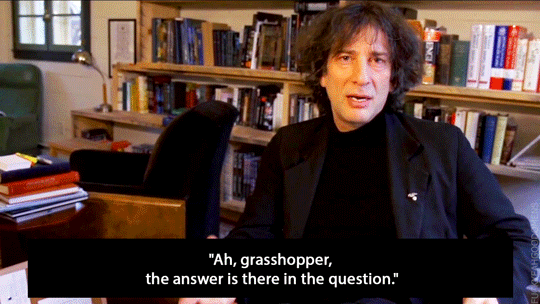
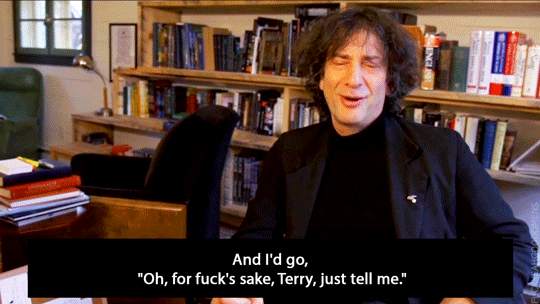

From the Neil Gaiman: Dream Dangerously 🥺❤ (you can watch it here in US or with US vpn :) <3) (or just this bit on youtube here :))
Neil Gaiman: I miss him most when I get stuck. You know, I'll just be
working on something and I'll go, "Oh, this isn't quite it," and all I want to do is just call Terry, tell him what's going on and have him say, "Ah, grasshopper, the answer is there in the question." And I'd go, "Oh, for fuck's sake, Terry, just tell me."
[Terry Pratchett laughing]
#good omens#gointerviewedit#terry pratchett#neil gaiman#terry and neil#terry interview#interview#neil interview#gnu terry pratchett#neil gaiman dream dangerously#fun fact#btb#dream dangerously#❤#neil about terry#grasshopper the answer is there in the question#ixi says ngk
25K notes
·
View notes
Text
'...“It’s fun playing bad, but actually he’s not,” the actor says, smiling as he reflects on his character, Crowley. “He’s a villain with a heart. The amount of really evil things he does are vanishingly small.”
...As it always has, “Good Omens” dissects the view of good and evil as absolutes, showing viewers that they are not as separate as we were led to believe growing up. Aziraphale and Crowley’s long-standing union is proof of this. The show also urges people to look at what defines our own humanity. For Tennant — who opted to wear a T-shirt emblazoned with the words “Leave trans kids alone you absolute freaks” during a photocall for Season 2 — these themes are more important now than ever before.
“In this society that we’re currently living in, where polarization seems ever more present, fierce and difficult to navigate. Negotiation feels like a dirty word at times,” he says, earnestly. “This is a show about negotiation. Two extremes finding common ground and making their world a better place through it. Making life easier, kinder and better. If that’s the sort of super objective of the show, then I can’t think of anything more timely, relevant or apt for the rather fractious times we’re living in.”
“Good Omens” is back by popular demand for another season. How does it feel?
It’s lovely. Whenever you send something out into the world, you never quite know how it will land. Especially with this, because it was this beloved book that existed, and that creates an extra tension that you might break some dreams. But it really exploded. I guess we were helped by the fact that we had Neil Gaiman with us, so you couldn’t really quibble too much with the decisions that were being made. The reception was, and continues to be, overwhelming.
Now that you’re no longer bound by the original material that people did, perhaps, feel a sense of ownership over, does the new content for Season 2 come with a sense of freedom for you? This is uncharted territory, of sorts.
That’s an interesting point. I didn’t know the book when I got the script. It was only after that I discovered the worlds of passion that this book had incited. Because I came to it that way, perhaps it was easier. I found liberation from that, to an extent. For me, it was always a character that existed in a script. At first, I didn’t have that extra baggage of expectation, but I acquired it in the run-up to Season 1 being released… the sense that suddenly we were carrying a ming vase across a minefield.
In Season 2, we still have Neil and we also have some of the ideas that he and Terry had discussed. During the filming of the first one, Neil would drop little hints about the notions they had for a prospective sequel, the title of which would have been “668: The Neighbour of the Beast,” which is a pretty solid gag to base a book around. Indeed there were elements like Gabriel and the Angels, who don’t feature in the book, that were going to feature in a sequel. They were brought forward into Season 1. So, even in the new episodes, we’re not entirely leaving behind the Terry Pratchett-ness of it all.
It’s great to see yourself and Michael Sheen reunited on screen as these characters. Fans will have also watched you pair up for Season 3 of “Staged.” You’re quite the dynamic duo. What do you think is the magic ingredient that makes the two of you such a good match?
It’s a slightly alchemical thing. We knew each other in passing before, but not well. We were in a film together [“Bright Young Things,” 1993] but we’d never shared a scene. It was a bit of a roll of the dice when we turned up at the read-through for “Good Omens.” I think a lot comes from the writing, as we were both given some pretty juicy material to work with. Those characters are beloved for a reason because there’s something magical about them and the way they complete each other. Also, I think we’re quite similar actors in the way we like to work and how we bounce off each other.
Does the shorthand and trust the two of you have built up now enable you to take more risks on-screen?
Yes, probably. I suppose the more you know someone, the more you trust someone. You don’t have to worry about how an idea might be received and you can help each other out with a more honest opinion than might be the case if you were, you know, dancing around each other’s nervous egos. Enjoying being in someone’s orbit and company is a positive experience. It makes going to work feel pleasant, productive, and creative. The more creative you can be, the better the work is. I don’t think it’s necessarily a given that an off-screen relationship will feed into an on-screen one in a positive or negative way. You can play some very intimate moments with someone you barely know. Acting is a peculiar little contract, in that respect. But it’s disproportionately pleasurable going to work when it’s with a mate.
Fans have long discussed the nature of Crowley and Aziraphale’s relationship. In Season 2, we see several of the characters debate whether the two are an item, prompting them to look at their union and decipher what it is. How would you describe their relationship?
They are utterly co-dependent. There’s no one else having the experience that they are having and they’ve only got each other to empathize with. It’s a very specific set of circumstances they’ve been dealt. In this season, we see them way back at the creation of everything. They’ve known each other a long time and they’ve had to rely on each other more and more. They can��t really exist one without the other and are bound together through eternity. Crowley and Aziraphale definitely come at the relationship with different perspectives, in terms of what they’re willing to admit to the relationship being. I don’t think we can entirely interpret it in human terms, I think that’s fair to say.
Yet fans are trying to do just that. Do you view it as beyond romantic or any other labels, in the sense that it’s an eternal force?
It’s lovely [that fans discuss it] but you think, be careful what you wish for. If you’re willing for a relationship to go in a certain way or for characters to end up in some sort of utopian future, then the story is over. Remember what happened to “Moonlighting,” that’s all I’m saying! [Laughs]
Your father-in-law, Peter Davison, and your son, Ty Tennant, play biblical father-and-son duo Job and Ennon in Episode 2. In a Tumblr Q&A, Neil Gaiman said that he didn’t know who Ty’s family was when he cast him. When did you become aware that Ty had auditioned?
I don’t know how that happened. I do a bunch of self-tapes with Ty, but I don’t think I did this one with him because I was out of town filming “Good Omens.” He certainly wasn’t cast before we started shooting. There were two moments during filming where Neil bowled up to me and said, “Guess, who we’ve cast?” Ty definitely auditioned and, as I understand it, they would tell me, he was the best. I certainly imagine he could only possibly have been the best person for the job. He is really good in it, so I don’t doubt that’s true. And then my father-in-law showed up, as well, which was another delicious treat. In the same episode and the same family! It was pretty weird. I have worked with both of them on other projects, but never altogether.
There’s a “Doctor Who” cameo, of sorts, in Episode 5, when Aziraphale uses a rare annual about the series as a bartering tool. In reality, you’ll be reprising your Time Lord role on screen later this year in three special episodes to mark the 60th anniversary. Did you always feel you’d return to “Doctor Who” at some point?
There’s a precedent for people who have been in the series to return for a multi-doctor show, which is lovely. I did it myself for the 50th anniversary in 2013, and I had a wonderful time with Matt [Smith]. Then, to have John Hurt with us, as well, was a little treat. But I certainly would never have imagined that I’d be back in “Doctor Who” full-time, as it were, and sort of back doing the same job I did all those years ago. It was like being given this delightful, surprise present. Russell T Davies was back as showrunner, Catherine Tate [former on-screen companion] was back, and it was sort of like the last decade and a half hadn’t happened.
Going forward, Ncuti Gatwa will be taking over as the new Doctor. Have you given him any advice while passing the baton?
Oh God, what a force of nature. I’ve caught a little bit of him at work and it’s pretty exciting. I mean, what advice would you give someone? You can see Ncuti has so much talent and energy. He’s so inspired and charismatic. The thing about something like this is: it’s the peripherals, it’s not the job. It’s the other stuff that comes with it, that I didn’t see coming. It’s a show that has so much focus and enthusiasm on it. It’s not like Ncuti hasn’t been in a massive Netflix series [“Sex Education,”] but “Doctor Who” is on a slightly different level. It’s cross-generational, international, and has so much history, that it feels like it belongs to everyone.
To be at the center of the show is wonderful and humbling, but also a bit overwhelming and terrifying. It doesn’t come without some difficulties, such as the immediate loss of anonymity. It takes a bit of getting used to if that’s not been your life up to that point. I was very lucky that when I joined, Billie Piper [who portrayed on-screen companion, Rose] was still there. She’d lived in a glare of publicity since she was 14, so she was a great guide for how to live life under that kind of scrutiny. I owe a degree of sanity to Billie.
Your characters are revered by a few different fandoms. Sci-fi fandoms are especially passionate and loyal. What is it like being on the end of that? I imagine it’s a lot to hold.
Yes, certainly. Having been a fan of “Doctor Who” since I was a tiny kid, you’re aware of how much it means because you’re aware of how much it meant to you. My now father-in-law [who portrayed Doctor Who in the 80s] is someone I used to draw in comic strips when I was a kid. That’s quite peculiar! It’s a difficult balance because on one end, you have to protect your own space, and there aren’t really any lessons in that. That does take a bit of trial and error, to an extent, and it’s something that you’re sometimes having to do quite publicly. But, it is an honor and a privilege, without a doubt. As you’ve said, it means so much to people and you want to be worthy of that. You have to acknowledge that and be careful with it. Some days that’s tough, if you’re not in the mood.
I know you’re returning to the stage later this year to portray Macbeth. You’ve previously voiced the role for BBC Sounds, but how are you feeling about taking on the character in the theater?
I’m really excited about it. It’s been a while since I’ve done Shakespeare. It’s very thrilling but equally — and this analogy probably doesn’t stretch — it’s like when someone prepares for an Olympic event. It does feel like a bit of a mountain and, yeah, you’re daring to set yourself up against some fairly worthy competition from down the years. That’s both the challenge and the horror of doing these types of things. We’ve got a great director, Max Webster, who recently did “Life of Pi.” He’s full of big ideas. It’s going to be exciting, thrilling, and a little bit scary. I’m just going to take a deep breath.
Before we part ways, let’s discuss the future of “Good Omens.” Gaiman has said that he already has ideas for Season 3, should it happen. If you were to do another season, is there anyone in particular you’d love to work with next time around or anything specific you’d like to see happen for Crowley?
Oh, Neil Gaiman knows exactly where he wants to take it. If you’re working with people like Gaiman, I wouldn’t try to tamper with that creative void. Were he to ask my opinion, that would be a different thing, but I can’t imagine he would. He’s known these characters longer than me and what’s interesting is what he does with them. That’s the bit that I’m desperate to know. I do know where Crowley might end up next, but it would be very wrong if I told you.
[At this point, Tennant picks up a pencil and starts writing on a hotel pad of paper.]
I thought you were going to write it down for me then. Perhaps like a clandestine meeting on a bench in St James’ Park, but instead you’d write the information down and slide it across the table…
I should have done! I was drawing a line, which obviously, psychologically, I was thinking, “Say no more. You’re too tempted to reveal a secret!” It was my subconscious going “Shut the fuck up!”
#David Tennant#Michael Sheen#Good Omens#Neil Gaiman#Terry Pratchett#Ty Tennant#Peter Davison#Aziraphale#Crowley#Doctor Who#Macbeth#Ncuti Gatwa#Job#Ennon#Bright Young Things#Series 2#Matt Smith#John Hurt#Russell T. Davies#Catherine Tate#Max Webster#Life of Pi#Sex Education#Billie Piper#Rose Tyler#BBC Sounds
3K notes
·
View notes
Note
Hi Neil,
I hope this doesn't get buried in the ask box, but if it does, I'll still be glad I sent this, just to know this little lengthy slice of complement and thanks existed in your inbox is enough. I apologize for the length, I am pretty sure the grammar is in tatters...and probably just the general awkwardness in advance.
Frist of all, congratulations for Good Omens Season2, it's a roaring success even here in this...I don't know, bottomless pit? I myself and some others fondly call it the PRC. The show didn't made pass the firewall officially, neither was Prime Video. People still managed to watch it eventually by VPNs, shared accounts and when times are desperate...sorry, piracy. Chinese fans, including myself, using every tool in the shed to try to fool Amazon™ and our goverment, just to watch this on Prime and try to help to manifest S3, is one hell of an experience. This kind of experience is pathetic, ridiculous....and somehow hilarious in a dark, gallows humor way, almost like some bad spy comedy, I just have to share it. Worth all the trouble by the way, the reward at the end of the back channel is...well, some divine comedy to say the very least. All in all, it's a brilliant show and a solid job well-done.
Then some of my personal gratitude. They say good art resonates with your soul, I now know this is just as true as matter and gravity. Since I know Good Omens certainly resonated with mine. I'll redact the typical "depression and anxiety reduced me to a husk, a shadow of my former self" story and get to the result for brevity's sake. I can't write anything meaningful while I know I took joy in writing, I can't finish reading anything longer than a brochure while I know I was such a bookworm in the past. Then I was compelled to get up in the middle of the night, wrote a full 5000 character long analysis after marathoned S2, and then write even more analyses in both Chinese and English. I picked up American Gods because I know I need more Neil Gaiman in my life and then impressed by myself for actually finishes it the second time 5 years later. I didn't know how exactly that happened through one watch of a TV show, but I know I am changed for the better. I grasped life again, and can start living again, somehow. The resonation just keeps on giving.
This is a quiet, gentle and romantic story, it is soothing, accepting, filled to the brim with love and kindness, and it makes me feel safe and accepted and loved in a way I never felt before. I thank you for it, and hope thart I may have the privlige to witness more of this miracle. Thank you Neil, Sir Terry Pratchett and the team for this miraculous book and this miraculous show.
谢谢。(I just had to say thanks with my mother tongue, it feels more earnest this way)
Thank you so much! I'm impressed by everything you and your countryfolk have gone through to watch it as legitimately as you could.
3K notes
·
View notes
Text
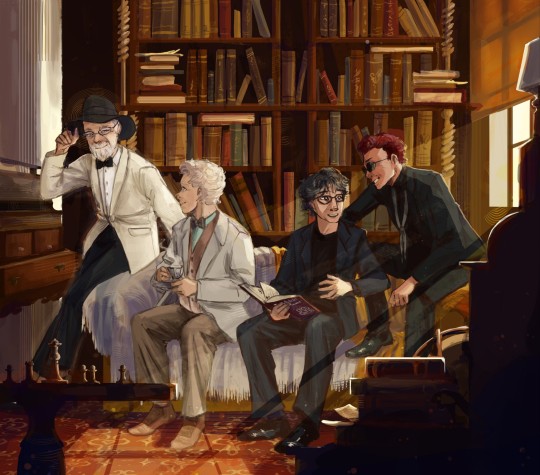
After watching Good Harbingers season 2, I decided to buy a book and inside there was a photo of Neil Gaiman and Terry Pratchett on the cover, then I thought - "Hmm, I wish Terry Pratchett could see what his and Neil Gaiman's book turned into." Therefore, this art was drawn out of gratitude for the story they gave us.
It's not my usual style (ps: I don't have one), but I'm still experimenting with how I'd like to draw in the future. I understand that there are a LOT of mistakes in this art, but what did I try ^ ^'
@neil-gaiman
#good omens#good omens fanart#neil gaiman#terry pratchett#aziracrow#aziraphale#crowley#digital art#fanart#good omens season 2
1K notes
·
View notes
Text
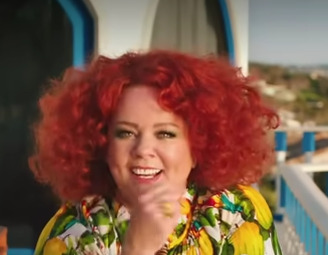

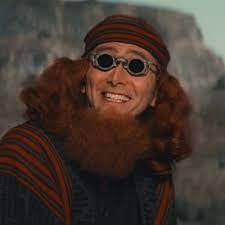
#good omens#good omens 2#bildad the shuhite#neil gaiman#neil gaiman is watching us#terry pratchett is watching us
43 notes
·
View notes
Text
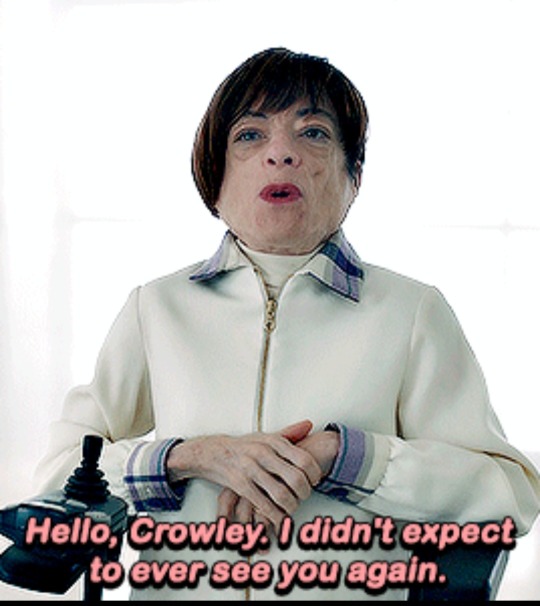
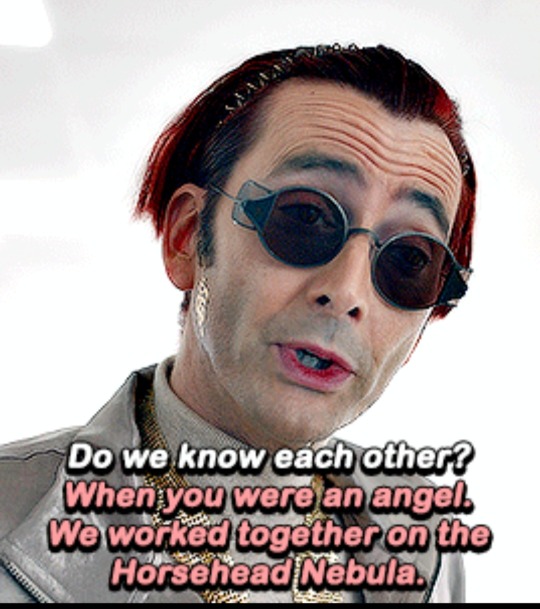
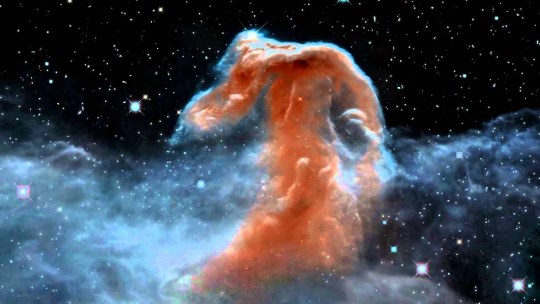
I think that Saraqael is one to watch. She recognized the purple energy burst, she could at least sense Goob/Jim when he fanned the Terry Pratchett book in her face. And wasn't a jerk boss to Muriel like the other Archangels.
But. Very importantly. She recognized Crowley in Heaven in his (atrocious) angel disguise, wasn't accusatory, and USED HIS CHOSEN NAME. Didn't deadname him, remembering their work on the Horsehead Nebula (pictured). And she, and Muriel, have elements of PURPLE in their clothing. I think she could be an ally to Aziraphale and/or see him if Metatron tries to conceal him (theoretically, obviously me speculating).
Also: as a wheelchair user, I WHOOPED when she made her OWN RAMP into the bookshop.🥰
#good omens#good omens aziraphale#good omens crowley#neil gaiman#@neil himself#ineffable husbands#good omens series 2#good omens season 2#go2 spoilers#go 2 speculation#angel crowley#good omens angels#starmaker
2K notes
·
View notes
Text
okay I watched good omens s2 yesterday with my partner, and I was genuinely very surprised -- I think if you've grown up through superwholock/merlin/the 100/teen wolf type shows where (with the exception periodically of doctor who) you kind of had to make up the good show that something could have been in your head, that colours a lot of your viewing, and to be honest I thought season 1 of good omens was a fine little piece, honoured the book while modernising it somewhat, it was a nice, fun, low stakes time, with a couple of things I might have wanted a tad different but nothing overall awful.
so I was seeing all this meta and gifsets and discussion, while I was waiting to give s2 a watch with my partner and thought "ah, people have made up the good show in their heads again" not that I assumed s2 was going to be a bad show, but that people were taking extra deep plunges into possibilities, the way fandom does, and that was fine. I knew there was a big ol kiss, I had a sense of some kind of argument at the end, and that it was setting up a s3
I also knew that mainstream reviews were calling it (politely) self-indulgent and dependent on whether or not you enjoy david tennant and michael sheen having a good time for just under 6 hours
all in all, expectations of a somewhat mainstream show without too much to think about, a nice, fun low stakes time, moving on...
(EDIT: AND THEN I WROTE A LOT OF WORDS SO YOU CAN IMAGINE THAT MY REACTION WAS QUITE DIFFERENT)
as it turns out it seems these things that were being written on tumblr were discussing the actual text of the show and not things you could extrapolate if you squinted and tilted your head a little to the left as I'm so used to doing, so in fact there is much to think about!
and my first thought was "this is like when you read early discworld books that ask a question like a joke, only to find that over time the answer to that question becomes very serious (and also can be funny at times of course)." how terry pratchett would pick and pick at tropes and notions and social ideas and go "oh now hold on, this seems strange..." starting way back when he thought it was odd that women warriors always seemed to be dressed in metal bikinis and then realising he hadn't done a good enough job of subverting the trope, simply by depicting it and calling it a bit silly
why do goblins always get treated as the villains? what's with this divine succession of kings business? where are the female dwarfs? who do we treat as disposable?
good omens season one went: "haha what if heaven and hell were intensely incapable, bureaucratic, corrupt, and uncaring of the work they did, and we took an angel and a demon and had them actually care? wouldn't that be... a bit silly?" (and it was)
good omens season two went: "what are the consequences for caring when the people who have power over you are incapable, bureaucratic, corrupt, and uncaring? what are the forces that supersede systems built on fear, ignorance, and violent conformity? can people change and break out of/challenge/break down these structures by caring?"
and this was set up with a neat little sleight of hand (to reference aziraphale's switch-and-bait in the episode with the nazi zombies), because the majority of season 2 does feel a bit indulgent: hey, remember those two wacky angel-and-demon characters? watch some more wacky things they did through the ages, watch them take a sojourn through 1827 Edinburgh and do a magic show during the Blitz, and... stop the death of Job's and Sitis' children (actually maybe that whole segment ought to have been what they call "A Clue")
see them try to figure out a kooky mystery, all the while setting up a cute little same-gender romance on their street. watch as everything points towards a happy ending that's all about the two of them realising what they've been to one another all these thousands and thousands (and thousands and thousands) of years- but hold on. lest we forget - and the show has made this point over and over - there are powerful people who control them, who hurt them, and who plan on hurting others, throughout the whole season, and as it turns out they know what they've been to one another for far far longer, and know how to pull their strings...
season 2 then, has to show us these things, not because they're indulgent (well, maybe occasionally, but the apology dance is still important), but because in order to make the ending a tragedy, we first need to understand, properly, the impact that they have had on each other. we need to understand that Aziraphale relied heavily on Crowley to be his moral compass and leaned on black-and-white thinking in order to deal with things, because if it's all grey then where does he fit and what has it all meant and heaven has to be the good guys, even as Job's and Sitis' children are ordered to be killed, it's all he ever had...
and Crowley was always an anchor, needed to trust that Aziraphale was different, needed to bend to every whim that Aziraphale has, because otherwise what's his worth in all this? After having been already deemed worthless by the heaven that Aziraphale needs to believe in?
and that, simplistically described, is the narrative that we're seeing in s2, and alongside that the ways that the changes they have upon each other are noticed, and monitored, and placed under suspicion, and finally... broken up, not by the clumsy, brute force that's been attempted over and over again, but by a promise to return into a violent, controlling system and to "make it better from within"
and all of this is wrapped up in two queer relationships + a third queered-within-the-text relationship that creates the inverse of how it ends for Aziraphale and Crowley (so far). queer love -- whatever shape that has -- is explicitly the shape of non-conformity within this narrative, including within the symbolism of angel-and-demon love of Gabriel and Beelzebub, which in the context of the systems created is considered queer (and one can argue till the cats come home about casting cis actors, about angel-and-demon notions of gender/romance/sexuality, but the "queerness" comes from building something non-conforming to the systems they exist in), and enforced by the explicitly our-world-definition-of queer romance that Nina and Maggie have going on (which, while less high stakes, still contains the background controlling relationship that Nina initially is in)
all of this to say, that I disagree that s2 meanders, or that plotlines happen for the sake of showcasing Aziraphale and Crowley without purpose, or that characters get sidelined (I'd say it sets up a whole host of interesting characters to further get into actually), or that it's strictly mainstream easy-access narrative that's just an excuse for the main creators and actors to get back together.
the love is the point, and this show takes its time to show the love (and the unequal boundary-setting, and the fact that one of them has an undiscussed tragic backstory, and the desperation to belong again, and the fear instilled by oppressive systems, and and and), so that we understand why those last 15 minutes happen the way that they do
it's sleight of hand, and like all good magic, you don't notice until it's happened
1K notes
·
View notes
Text
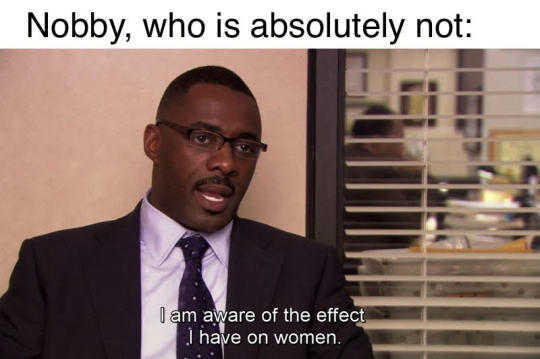
#discworld#gnu terry pratchett#meme#discworld meme#created by yours truly#the watch#nobby nobbs#the office#the office us
7 notes
·
View notes
Text
Neil Gaiman's 3 cameos
"But Neil only has one cameo, it's in the movie theater!" Come now. What show are we watching? There is not just one cameo. There are three. The first one is...
The one that actually happened:

but then there is also...
The one that was supposed to happen, but didn't:

See those two people in the background? Lower left-hand corner of the screen? By rights, that should have been Neil and Terry, but Terry was taken from us too soon. Neil wrote this scene intending to do the cameo by himself, in honor of his friend, but on that day couldn't bring himself to do it:
Terry Pratchett and I, had a standing… not even a standing joke, just a standing plan, that we were going to have sushi - there was going to be a scene in Good Omens where sushi was eaten and we were gonna be extras, we were gonna sit in the background, eating sushi while it was done. And I was so looking forward to this and, so I wrote this scene with it being sushi, even though Terry was gone, with that in mind and I thought: Oh, I’ll sit and I’ll eat lots of sushi as an extra, this will be my scene as an extra, I’ll just be in the background. And then, on the day, or a couple of days before, I realized that I couldn’t do it. [...] it was written for Terry and all of the sushi meals we’d ever had and all of the strange way that sushi ran through Good Omens.
The fact that the scene exists at all, I think, can be taken as a cameo. I would interpret it as one of Neil's cameos, since he wrote it as a self-insert of an important aspect of his relationship to the work, but it is also Terry's cameo. Focusing on the empty space where something ought to be is itself a representation of what is missing; there is something to be said for drawing attention to absence, which is what our knowledge of how this scene came to be accomplishes.
There's no good way for me to transition to the next part of this meta other than to encourage you to take a deep breath and remember that Terry Pratchett has been immortalized by this and other works. He is beloved, and not forgotten, and lives on in our hearts, and we honor him by celebrating his works not only in mourning but in the full range of emotion that his works inspired in us, including laughter.
Because this next part is just silly.
Neil's AU Gary Stu cameo:
Neil Gaiman has told the story multiple times about how a careers advisor tried to redirect his life course from storytelling to... *shudder* accountancy. Here's one quote [source]:
Gaiman: I very much wanted to write comics. I remember as a kid, I was 15, and I had a meeting with an outside careers adviser. I was asked, “OK, well, what do you want to be?” And I said, “Well, I really want to write American comics.” There was a long pause, and then the outside careers adviser said, “Well, how do you go about doing that then?” I said, “You’re the careers adviser. You tell me.” And then there was another seriously long pause, and the adviser said, “Have you ever thought about accountancy?” I said, “No, I have never thought about accountancy.” And then we just sat and stared at each other.
We are all very lucky that teenager!Neil decided to completely disregard this advice, but Good Omens S1E2 contains a character that seems to resemble who Neil would have become (or thought he would have become) if he had let that careers advisor drag him into a life of bean-counting mundanity.

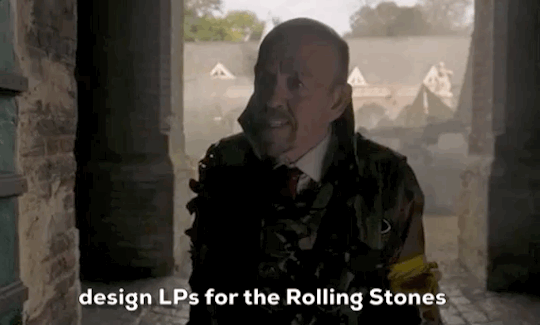
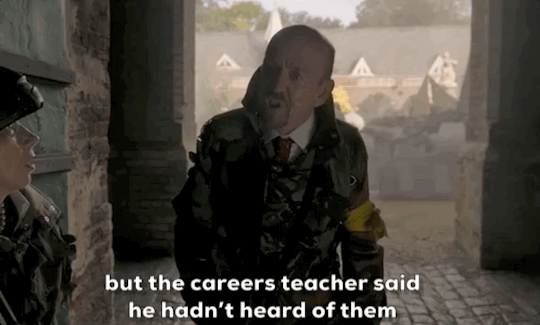

We may not see Neil's face in this scene, but we do get to experience his existential dread of the what if: what if I had never become a storyteller? What if I had listened to that wanker, and lived a life without following my dreams?
I'd say it counts as a cameo.
#good omens#good omens meta#neil gaiman#cameos#this meta somehow got a second life I have no idea how or why but we’re on our way to being blessed by Beelzebub
788 notes
·
View notes